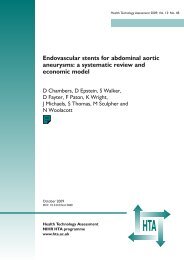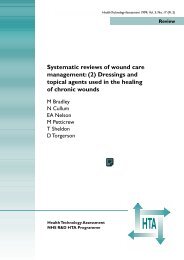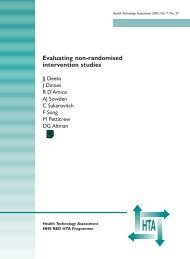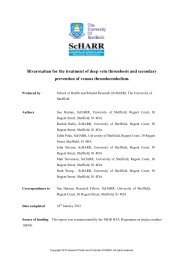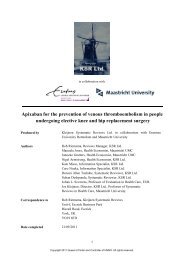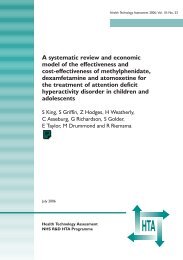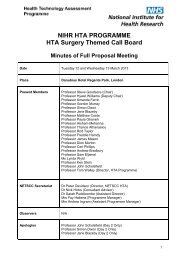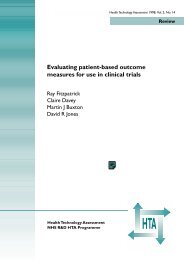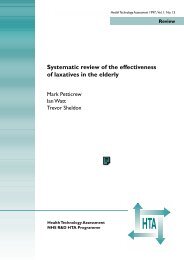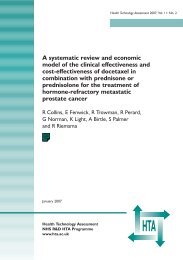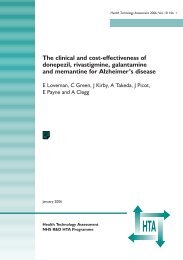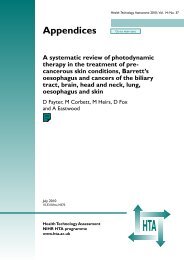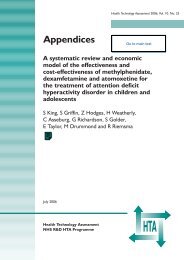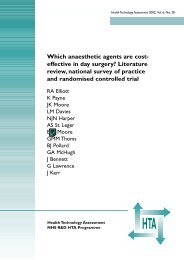How far does screening women for domestic (partner) - NIHR Health ...
How far does screening women for domestic (partner) - NIHR Health ...
How far does screening women for domestic (partner) - NIHR Health ...
You also want an ePaper? Increase the reach of your titles
YUMPU automatically turns print PDFs into web optimized ePapers that Google loves.
42<br />
Review Question III<br />
McDonnell and colleagues 112 recruited 481 patients<br />
attending their first antenatal appointment at<br />
an Irish hospital. Of the <strong>women</strong> who answered<br />
the questions regarding acceptability of <strong>partner</strong><br />
violence <strong>screening</strong>, 468 (99%) found the questions<br />
acceptable and considered that all <strong>women</strong> should<br />
be asked these questions. There were no differences<br />
in acceptability by abuse status or by age.<br />
A study by McNutt and colleagues 113 recruited<br />
<strong>women</strong> from a health maintenance organisation<br />
(HMO), <strong>partner</strong> violence programmes and refuges.<br />
The survey incorporated questions on what <strong>women</strong><br />
want nurses and physicians to ask, and what they<br />
want them to do and not do in order to help<br />
abused <strong>women</strong>. Forty percent of <strong>women</strong> in the<br />
HMO and community-based programmes and 64%<br />
in refuges agreed with <strong>screening</strong>.<br />
Newman and colleagues 114 conducted a survey of<br />
451 <strong>women</strong> who were unaccompanied by a male<br />
<strong>partner</strong> in a paediatric emergency department in<br />
a US hospital. When asked if it was appropriate to<br />
screen them <strong>for</strong> <strong>partner</strong> violence when they sought<br />
care <strong>for</strong> their children, 75% of <strong>women</strong> stated it<br />
was. Forty-four percent preferred direct verbal<br />
questioning, 36% a written questionnaire, and 20%<br />
suggested other methods of <strong>screening</strong>.<br />
Renker and Tonkin 102 used anonymous computer<br />
interviews in two maternity units in the USA.<br />
Topics covered in the interview included <strong>screening</strong><br />
and interventions, past disclosure to health-care<br />
providers, preferences or attitudes towards violence<br />
<strong>screening</strong>, pregnancy violence and violence severity<br />
<strong>screening</strong>. Feelings of anger, embarrassment<br />
or being offended were not experienced by<br />
the majority (97%) of <strong>women</strong> screened by their<br />
prenatal care providers <strong>for</strong> <strong>partner</strong> abuse.<br />
Richardson and colleagues 41 surveyed 1207 <strong>women</strong><br />
in 13 randomly selected general practices in<br />
London. Eighty percent of <strong>women</strong> reported that<br />
they would not mind being asked by their general<br />
practitioner about abuse or violence in their<br />
relationship if they had come about something else.<br />
Romito and colleagues 107 conducted a survey<br />
in six family practice sites in Italy. Women were<br />
approached and asked if they would like to<br />
participate in a study to improve how health<br />
services respond to <strong>women</strong>’s health problems.<br />
Eighty-five percent of respondents believed the<br />
family doctor should ask all <strong>women</strong> about violence,<br />
7% thought doctors should not ask, and 8%<br />
were uncertain. A higher percentage of <strong>women</strong><br />
experiencing current abuse agreed that doctors<br />
should ask about abuse compared with <strong>women</strong><br />
not currently experiencing abuse, although this<br />
association was not significant. Younger <strong>women</strong><br />
were significantly less likely to agree that all doctors<br />
should ask about abuse.<br />
Sethi and colleagues 48 administered a modified<br />
World <strong>Health</strong> Organization (WHO) Multi-country<br />
Domestic Violence Study questionnaire in an<br />
inner-city accident and emergency department<br />
in a British hospital. The questions asked about<br />
the nature of violence and abuse experienced<br />
and <strong>women</strong>’s views on being asked about abuse in<br />
an accident and emergency department setting.<br />
Overall, 76% felt com<strong>for</strong>table when asked about<br />
<strong>partner</strong> violence. Eighteen percent felt slightly<br />
uncom<strong>for</strong>table, 5% felt uncom<strong>for</strong>table and<br />
1% felt very uncom<strong>for</strong>table. Feelings of being<br />
uncom<strong>for</strong>table were higher in those who had<br />
experienced abuse compared with those who had<br />
not (10% versus 3%, p = 0.02). In response to a<br />
question about the desirable frequency of being<br />
asked about <strong>partner</strong> violence, 35% felt it should be<br />
on all occasions, 26% felt they should usually be<br />
asked, 38% said seldom and 2% felt never. Many<br />
<strong>women</strong> commented on the need <strong>for</strong> privacy and<br />
safety and expressed concern about direct questions<br />
being asked of <strong>women</strong> presenting with injuries.<br />
Zeitler and colleagues 115 recruited <strong>women</strong> aged<br />
between 15 and 24 years who presented <strong>for</strong> family<br />
planning services to a US clinic. Almost 90% of<br />
those surveyed felt that universal <strong>screening</strong> by<br />
health-care providers is a ‘very good’ or ‘somewhat<br />
good’ idea. When respondents were categorised<br />
according to how much they minded being asked<br />
about violence, there were no differences according<br />
to ethnicity, school enrolment, parity, family<br />
violence or lifetime dating violence experience.<br />
<strong>How</strong>ever, compared with <strong>women</strong> aged 19–21 years,<br />
<strong>women</strong> aged 15–18 years were 2.9 times more likely<br />
to voice some concern regarding violence <strong>screening</strong><br />
by a provider (36%, p < 0.01).<br />
Webster and colleagues 116 administered a selfreport<br />
questionnaire to 1313 <strong>women</strong> from five<br />
Australian hospitals during the visit following<br />
the consultation at which they had been screened<br />
<strong>for</strong> <strong>partner</strong> violence. Ninety-eight percent of<br />
respondents believed it was a good idea to ask<br />
<strong>women</strong> about <strong>partner</strong> violence when visiting a<br />
hospital. There was no difference in the responses<br />
of <strong>women</strong> from rural, remote or inner city sites,<br />
nor were there differences between sites in terms<br />
of how <strong>women</strong> felt when asked <strong>partner</strong> violence



